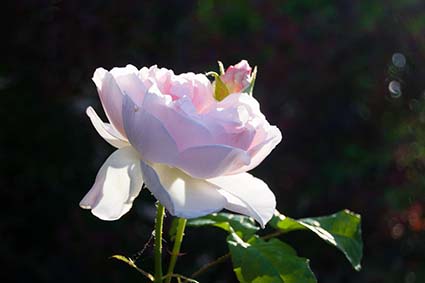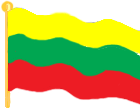Kalėdų rytų rožė inžydo
This seems to be a very old Lithuanian folk song about the cycle of the seasons, with roots in earlier traditions and symbols.
There's a version of this song called "Kalėdų rytų saulė pražydo" (The Sun Blossomed on Christmas Morn).

Kalėdų rytų rožė inžydo
A Rose Bloomed on Christmas Morning
Christmas Carol
Christmas Carol
(Lithuanian)
(English)
Kalėdų rytų rožė inžydo,
lylio kalėda kalėda,*
Sekminių rytu dyvai pasidarė,
lylio kalėda kalėda,
Dyvai pasidarė: ažerai užšalo,
lylio kalėda kalėda,
Jaunas bernelis ladelį kirto,
lylio kalėda kalėda,
Ladelį kirto, žirgelį girdė,
lylio kalėda kalėda,
Žirgelį girdė, mergeli virgdė,
lylio kalėda kalėda,
Atlakė elnias Devyniaragis,
lylio kalėda kalėda,
Ant pirmo rago ugnelė degė,
lylio kalėda kalėda,
An` antro rago kavoliai kalė,
lylio kalėda kalėda.
A rose bloomed on Christmas morning,
Christmas, Christmas gifts,*
On Pentecost** morning a miracle happened
Christmas, Christmas gifts,
A miracle happened, lakes froze,
Christmas, Christmas gifts,
A young boy cut through the ice,
Christmas, Christmas gifts,
Cut through the ice to give his horse a drink
Christmas, Christmas gifts,
To give his horse a drink, making a maiden cry,
Christmas, Christmas gifts,
Then a deer with nine antlers came along
Christmas, Christmas gifts,
On the first antler a flame was burning,
Christmas, Christmas gifts,
On the second antler, smiths were forging***
Christmas, Christmas gifts!
Notes
*Regarding the refrain, "lylio kalėda kalėda":
"Kalėda doesn't have any particular meaning, except that it derives from the word 'Kalėdos' which means Christmas or Christmas gifts. Here it is used as a refrain. Same with 'lylio'." -GeSpintoje/YouTube
**The Pentecost is also called Whit Sunday. It takes place in the Spring. It's the 7th Sunday after Easter and it commemorates the descent of the Holy Spirit upon Christ's disciples.
***It seems this is connected to Thor's hammer (symbolically the hammer of blacksmiths) that he used in Spring to break up the winter ice.
Comments
If anyone can share more about the origin and symbolism of this song, please email me. -Mama Lisa

Thanks!
Thanks!
Thanks and Acknowledgements
Translated by Lisa Yannucci. Photo by Monique Palomares.

























